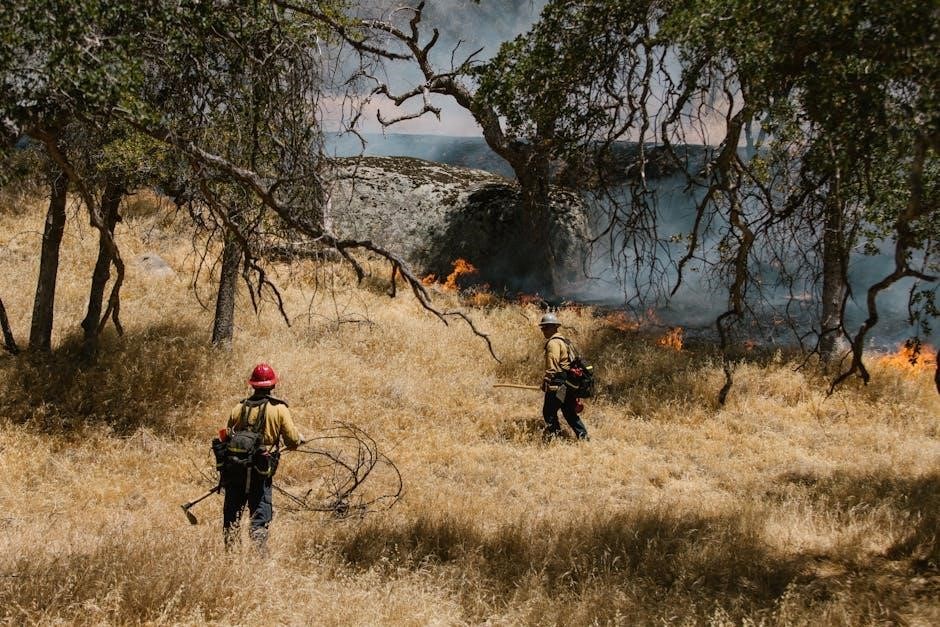NFPA 1041: Standard for Fire and Emergency Services Instructor Professional Qualifications
NFPA 1041 is a crucial standard that defines the professional qualifications for fire and emergency services instructors. It outlines the necessary job performance requirements for various instructor levels‚ ensuring competent and effective training within the fire service and related fields.
Overview of NFPA 1041
NFPA 1041‚ the Standard for Fire and Emergency Services Instructor Professional Qualifications‚ is a comprehensive document published by the National Fire Protection Association (NFPA). This standard establishes the minimum job performance requirements (JPRs) for individuals who deliver training in the fire and emergency services. It’s designed to ensure instructors possess the necessary knowledge‚ skills‚ and abilities to effectively teach and evaluate students.
The standard covers different levels of instructors‚ typically ranging from Instructor I to Instructor III‚ with each level requiring increasing expertise and responsibility. NFPA 1041 addresses key areas such as instructional development‚ program management‚ and instructional delivery. By adhering to NFPA 1041‚ training programs can ensure consistency and quality in the education and development of fire and emergency services personnel. The standard is periodically updated to reflect changes in the industry and best practices in instructional methodology.

Purpose and Scope of NFPA 1041
The primary purpose of NFPA 1041‚ Standard for Fire and Emergency Services Instructor Professional Qualifications‚ is to define the minimum requirements for individuals who instruct fire and emergency services personnel. It aims to ensure that instructors possess the necessary competencies to deliver effective‚ safe‚ and standardized training programs. The standard promotes professionalism and enhances the quality of education within the fire and emergency services.
The scope of NFPA 1041 encompasses various aspects of instructor responsibilities‚ including instructional development‚ program management‚ and instructional delivery. It outlines specific job performance requirements (JPRs) for different instructor levels‚ ensuring a progressive development path for instructors. The standard applies to individuals responsible for delivering training in a wide range of fire and emergency service disciplines‚ contributing to the overall competency and readiness of personnel in these critical fields. NFPA 1041 serves as a benchmark for certification and accreditation programs‚ promoting consistent and high-quality training across jurisdictions.

Key Requirements of NFPA 1041
NFPA 1041 outlines key requirements for instructors‚ including job performance requirements (JPRs) at different levels. These requirements cover instructional development‚ program management‚ and delivery methods‚ ensuring instructors possess the necessary skills and knowledge.
Instructor I Job Performance Requirements
NFPA 1041 outlines specific job performance requirements (JPRs) for Instructor I. These JPRs define the foundational skills and knowledge expected of an entry-level fire and emergency services instructor. Instructor I personnel should demonstrate proficiency in basic instructional techniques‚ including lesson plan development and classroom management. They must be able to effectively deliver training sessions‚ assess student performance‚ and maintain a safe learning environment.
Furthermore‚ Instructor I candidates should possess a strong understanding of learning principles and instructional methods. They should be capable of adapting their teaching style to accommodate diverse learning needs. The JPRs also emphasize the importance of ethical conduct and adherence to organizational policies. Instructor I instructors should be able to evaluate training materials and equipment‚ as well as maintain accurate training records. These requirements ensure that Instructor I instructors are well-prepared to deliver quality training programs.
Instructor II Job Performance Requirements
NFPA 1041 defines the job performance requirements (JPRs) for Instructor II‚ representing a significant advancement in instructional expertise. Instructor II personnel must demonstrate proficiency beyond the Instructor I level‚ showcasing advanced skills in instructional design‚ delivery‚ and evaluation. They are expected to develop comprehensive lesson plans‚ incorporating various teaching methodologies and assessment tools.
Instructor II instructors should also demonstrate the ability to manage complex training scenarios and adapt to changing circumstances. They need to be adept at mentoring and evaluating other instructors‚ providing guidance and feedback to enhance their teaching effectiveness. Moreover‚ Instructor II candidates should be able to analyze training needs and develop customized training programs to meet specific organizational requirements. They must demonstrate leadership skills in coordinating training activities and ensuring compliance with relevant standards and regulations. Instructor II certification signifies a commitment to excellence in fire and emergency services instruction.
Instructor III Job Performance Requirements
NFPA 1041 outlines the stringent job performance requirements (JPRs) for Instructor III‚ the highest level of instructor certification. Instructor III personnel must exhibit mastery in all aspects of fire and emergency services instruction‚ demonstrating exceptional leadership‚ program management‚ and instructional development skills. They are expected to design‚ implement‚ and evaluate comprehensive training programs that align with organizational goals and industry best practices.
Instructor III instructors should also demonstrate expertise in curriculum development‚ needs assessment‚ and resource allocation. They need to be proficient in conducting research‚ analyzing data‚ and developing innovative training solutions. Moreover‚ Instructor III candidates should be able to mentor and evaluate instructors at all levels‚ providing guidance and support to foster professional growth. They must demonstrate the ability to manage large-scale training initiatives‚ ensuring quality‚ consistency‚ and compliance with relevant standards. Instructor III certification signifies the pinnacle of achievement in fire and emergency services instruction.

NFPA 1041: 2019 Edition Updates
The 2019 edition of NFPA 1041 incorporates updated job performance requirements and emphasizes program management‚ instructional development‚ and delivery. These changes reflect advancements in training methodologies and aim to enhance instructor effectiveness in fire and emergency services.
Changes in Job Performance Requirements (JPRs)
The 2019 edition of NFPA 1041 introduces several key changes to the Job Performance Requirements (JPRs) for fire and emergency services instructors. These revisions aim to ensure that instructors are equipped with the latest knowledge and skills necessary to deliver effective training. The updates reflect evolving industry practices and technological advancements‚ enhancing the overall quality of instruction.
One significant change involves a greater emphasis on the use of technology in training. Instructors are now expected to be proficient in utilizing various digital tools and platforms to enhance the learning experience. This includes incorporating multimedia presentations‚ interactive simulations‚ and online resources into their teaching methods. Furthermore‚ the updated JPRs address the importance of adapting instructional strategies to meet the diverse needs of learners‚ promoting inclusivity and accessibility in training programs.
The revised JPRs also place a stronger emphasis on critical thinking and problem-solving skills. Instructors are now required to demonstrate their ability to analyze complex scenarios and develop effective solutions‚ preparing students to handle real-world challenges in the field. These changes ensure that instructors are not only knowledgeable but also capable of imparting practical skills and fostering a culture of continuous improvement.
Focus on Program Management‚ Instructional Development‚ and Delivery
NFPA 1041 places a significant emphasis on program management‚ instructional development‚ and delivery‚ recognizing these as critical components of effective instructor performance. Instructors must demonstrate competence in managing training programs‚ ensuring they are well-organized‚ efficient‚ and aligned with organizational goals. This includes developing schedules‚ coordinating resources‚ and maintaining accurate records.
Instructional development is another key area of focus. NFPA 1041 requires instructors to be skilled in designing and developing instructional materials that are engaging‚ relevant‚ and aligned with learning objectives. This involves conducting needs assessments‚ selecting appropriate instructional strategies‚ and creating assessments to measure student learning. Furthermore‚ instructors must be able to adapt their instructional methods to meet the diverse needs of learners.
Effective instructional delivery is also paramount. Instructors must be able to communicate clearly and effectively‚ facilitate active learning‚ and provide constructive feedback. They should also be proficient in using various instructional techniques‚ such as lectures‚ demonstrations‚ and simulations‚ to enhance student engagement and promote knowledge retention. Ultimately‚ the goal is to create a positive and supportive learning environment that fosters student success.

Certification Based on NFPA 1041
Certification based on NFPA 1041 provides a standardized and recognized method for verifying the competency of fire and emergency services instructors. This certification process ensures that instructors meet the minimum job performance requirements outlined in the standard‚ enhancing the quality and consistency of training programs.
The certification process typically involves a combination of written examinations‚ practical skills assessments‚ and documentation of experience. Candidates must demonstrate their knowledge of instructional principles‚ program management‚ and instructional delivery techniques. They must also demonstrate their ability to effectively teach and assess student learning in a variety of scenarios.
Successful completion of the certification process results in the issuance of a certificate‚ which is often recognized by state and local agencies. This certification can enhance an instructor’s credibility‚ improve career opportunities‚ and demonstrate a commitment to professional development. Moreover‚ it assures students and employers that the instructor possesses the necessary skills and knowledge to deliver effective training.
Agencies offering certification based on NFPA 1041 play a vital role in maintaining the integrity and quality of the certification process.
Training Programs Aligned with NFPA 1041
Training programs aligned with NFPA 1041 are specifically designed to equip individuals with the knowledge‚ skills‚ and abilities necessary to meet the job performance requirements outlined in the standard. These programs serve as a pathway for aspiring instructors to achieve certification and excel in their roles.
These training initiatives cover a wide range of topics‚ including instructional methodology‚ program development‚ classroom management‚ and assessment techniques. They emphasize practical application‚ allowing participants to develop hands-on experience through simulations‚ exercises‚ and real-world scenarios.
Curricula are meticulously crafted to align with the specific requirements for each instructor level (I‚ II‚ and III)‚ ensuring that trainees receive targeted and relevant instruction. Programs frequently incorporate the latest best practices and emerging trends in fire and emergency services training.
Completion of an NFPA 1041-aligned training program is often a prerequisite for certification. These programs offer a structured and comprehensive approach to instructor development‚ empowering individuals to become effective educators and leaders in the fire and emergency services community. By adhering to NFPA 1041‚ these programs contribute significantly to the professionalism and competence of instructors.
Resources for NFPA 1041 Compliance
To ensure compliance with NFPA 1041‚ various resources are available‚ including the official NFPA website‚ publications‚ training materials‚ and expert consultations. These resources provide guidance on interpreting and implementing the standard’s requirements effectively.
NFPA Official Website and Publications
The NFPA’s official website serves as the primary hub for comprehensive information regarding NFPA 1041. Here‚ users can access the complete standard‚ including all its chapters and annexes‚ typically available for purchase or through subscription services. The website offers supplementary materials such as handbooks‚ guides‚ and frequently asked questions that clarify the standard’s intent and application.
NFPA publications‚ including the standard itself‚ are meticulously updated to reflect the latest advancements in fire service training and professional qualifications. These resources incorporate insights from experts and practitioners‚ ensuring the standard remains relevant and effective. Furthermore‚ the NFPA website provides access to errata‚ interpretations‚ and other official updates that address specific questions or concerns related to NFPA 1041.
For those seeking a deeper understanding‚ NFPA offers various training programs and educational materials aligned with the standard. These resources help individuals and organizations effectively implement NFPA 1041 and achieve compliance. Accessing these official NFPA resources is essential for ensuring accurate interpretation and proper application of the standard.
